
The Hysteron Proteron Club, sometimes spelt "Husteron Proteron", was a dining club at Balliol College, Oxford, in the 1920s.

The Hysteron Proteron Club, sometimes spelt "Husteron Proteron", was a dining club at Balliol College, Oxford, in the 1920s.
The name refers to a hysteron proteron, a rhetorical device and figure of speech in which a natural or rational order is reversed, as in phrase "then came the thunder and the lightning". [1]

The main purpose of the Hysteron Proteron Club was to eat meals backwards, and there was at least one dinner per term, which began with coffee and liqueurs and ended with the soup course. However, the Club's activities went beyond this. Neville Shute later remembered a meal which lasted for twelve hours, beginning at 9 am and going on until 9 pm, starting with coffee and followed by a naked swim at Parsons' Pleasure, usually a pre-breakfast activity. [2] [ unreliable source? ] Another dinner was a so-called “circular feast”, at which the courses were, as usual, eaten backwards and each was eaten at a different place around Oxford, beginning and ending at rooms in St Michael's Street. [2] [ unreliable source? ]
Graham Greene was a member and told his mother that once a term the club had a "backwards day". He reported that after finishing with porridge "we then returned backwards to Balliol... This morning started with bridge in dinner jackets". [3] Evelyn Waugh, who had been at another college from 1922 to 1924, similarly recalled in A Little Learning that members "put themselves to great discomfort by living a day in reverse". [4] [5] In 1954, Keith Hancock (1898–1988), a distinguished Australian historian, who was at Balliol in the 1920s, revealed that he had "hankered secretly for an invitation to join the Husteron Proteron Club". [6]
The club was revived in 1980 at Trinity, Oxford by a classicist and the full day backwards was properly done, beginning the day with cigars, brandy and port in black tie. [ citation needed ]
In 1999, Peter Brooke, the son of a Club member, referred to the Club during a debate in the House of Commons on the Greater London Authority Bill: [7]
There is an element of usterou proterou, or the Husteron and Proteron club, in the order in which events have been presented. That club existed at the university of Oxford in the 1920s. Once a term, its members lived their lives backwards. They would get up, have a whisky and soda and then play some bridge. They would end up by having porridge late at night. In the Bill, the fact that the advice that various people give the mayor cannot be requested comes before the provisions for appointments and for the terms and conditions of those who are appointed. I understand that Bills have to be constructed in that way, but that does not make them easier to understand. [7]
He mentioned the Club again in a debate on the Learning and Skills Bill in 2000, [8] and again in the House of Lords in July 2002. [9]
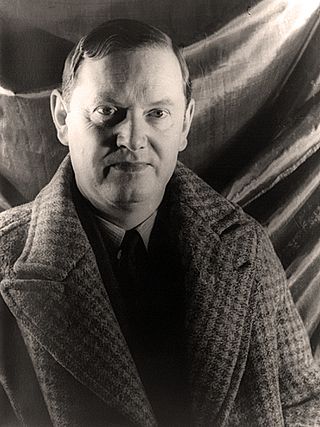
Arthur Evelyn St. John Waugh was an English writer of novels, biographies, and travel books; he was also a prolific journalist and book reviewer. His most famous works include the early satires Decline and Fall (1928) and A Handful of Dust (1934), the novel Brideshead Revisited (1945), and the Second World War trilogy Sword of Honour (1952–1961). He is recognised as one of the great prose stylists of the English language in the 20th century.

Henry Graham Greene was an English writer and journalist regarded by many as one of the leading novelists of the 20th century.

Breakfast is the first meal of the day usually eaten in the morning. The word in English refers to breaking the fasting period of the previous night. Various "typical" or "traditional" breakfast menus exist, with food choices varying by regions and traditions worldwide.

Porridge is a food made by heating or boiling ground, crushed or chopped starchy plants, typically grain, in milk or water. It is often cooked or served with added flavourings such as sugar, honey, fruit, or syrup to make a sweet cereal, or it can be mixed with spices, meat, or vegetables to make a savoury dish. It is usually served hot in a bowl, depending on its consistency. Oat porridge, or oatmeal, is one of the most common types of porridge. Gruel is a thinner version of porridge and congee is a savoury variation of porridge of Asian origin.
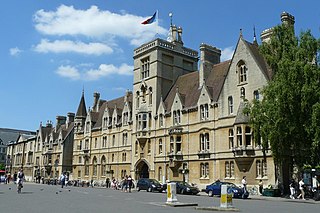
Balliol College is a constituent college of the University of Oxford. Founded in 1263 by John I de Balliol, it has a claim to be the oldest college in Oxford and the English-speaking world.
The Heart of the Matter (1948) is a novel by English author Graham Greene. The book details a life-changing moral crisis for Henry Scobie. Greene, a former British intelligence officer in Freetown, British Sierra Leone, drew on his experience there. Although Freetown is not mentioned in the novel, Greene confirms the location in his 1980 memoir, Ways of Escape.

Sir Harold Mario Mitchell Acton was a British writer, scholar, and aesthete who was a prominent member of the Bright Young Things. He wrote fiction, biography, history and autobiography. During his stay in China, he studied the Chinese language, traditional drama, and poetry, some of which he translated.
David James Christian Faber is a schoolmaster and former Conservative member of the Parliament of the United Kingdom. He did not seek re-election in 2001, after which he became an author, before in 2010 being appointed as head master of Summer Fields School, Oxford. He is the grandson of the late former Conservative Prime Minister Harold Macmillan (1894–1986).

Brian Christian de Claiborne Howard was an English poet and later a writer for the New Statesman.

Henry Brooke, Baron Brooke of Cumnor, was a British Conservative Party politician who served as Chief Secretary to the Treasury and Paymaster-General from 1961 to 1962 and — following the "Night of the Long Knives" — as Home Secretary from 1962 to 1964.

Arab cuisine is the cuisine of the Arab world, defined as the various regional cuisines of the Arab people, spanning from the Maghreb to the Fertile Crescent and the Arabian Peninsula. These cuisines are centuries old and reflect the culture of trading in ingredients, spices, herbs, and commodities. The regions have many similarities, but also unique traditions. They have also been influenced by climate, cultivation, and mutual commerce.
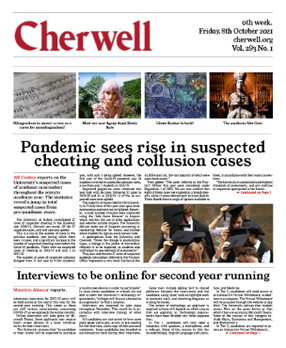
Cherwell is a weekly student newspaper published entirely by students of Oxford University. Founded in 1920 and named after a local river, Cherwell is a subsidiary of independent student publishing house Oxford Student Publications Ltd. Receiving no university funding, the newspaper is one of the oldest student publications in the UK.
Doctor Fischer of Geneva or The bomb party (1980) is a novel by the English novelist Graham Greene. The eponymous party has been examined as an example of a statistical search problem.
Hubert John Duggan was a British Army officer and politician, who was Conservative Party Member of Parliament for Acton from 1931 until his death. He was an opponent of appeasement and broke the whip on several important occasions, voting to bring down Neville Chamberlain in 1940.
Maurice Christopher Hollis, known as Christopher Hollis, was a British schoolmaster, university teacher, author and Conservative politician.
Michael Shelden is an American biographer and teacher, notable for his authorized biography of George Orwell, his history of Cyril Connolly's Horizon magazine, his controversial biography of Graham Greene, and his study of the last years of Mark Twain, Man in White. In March 2013 his Young Titan: The Making of Winston Churchill was published. In 2016 his biography of Herman Melville, Melville in Love, was published by Ecco/HarperCollins.

The Bright Young Things, or Bright Young People, was a nickname given by the tabloid press to a group of Bohemian young aristocrats and socialites in 1920s London. They threw flamboyant fancy dress parties, went on elaborate treasure hunts through nighttime London, and some drank heavily or used drugs — all of which was enthusiastically covered by journalists such as Charles Graves and Tom Driberg. They inspired a number of writers, including Nancy Mitford, Anthony Powell, Henry Green, Dorothy Sayers, and the poet John Betjeman. Evelyn Waugh's 1930 novel Vile Bodies, adapted as the 2003 film Bright Young Things, is a satirical look at this scene. Cecil Beaton began his career in photography by documenting this set, of which he was a member.
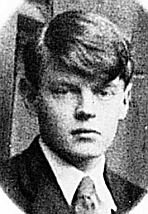
Alastair Hugh Graham was an honorary attaché in Athens and Cairo, an Oxford friend of Evelyn Waugh, and, according to Waugh's letters, one of his "romances". He is, together with Hugh Lygon and Stephen Tennant, considered the main inspiration for Sebastian Flyte in Brideshead Revisited.
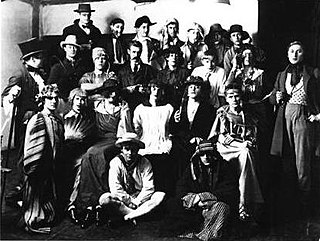
The Hypocrites' Club was one of the student clubs at Oxford University in England. Its motto in Greek, from an Olympian Ode by Pindar, was Water is best. This led to the members being called Hypocrites, due to the fact that beer, wine and spirits were the chosen drinks.